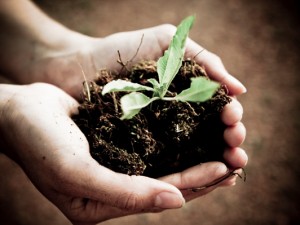How to Make Compost for Your Garden

If you have a garden at home or are leaning towards gardening, you should know the importance of compost. You can think of compost as a conditioner for your soil, feeding the microorganisms in it, adding nutrients and overall making your soil fit for plant growth. Moreover, making compost at home also takes care of your waste material, specifically kitchen waste, and if you make it in the right manner, it won’t smell too bad either.
Instructions
-
1
First you need to pick a site to make your compost. Ideally the location should be close to both your kitchen and garden, allowing you to conveniently move material, but should not be in the way of things or in plain sight either.
-
2
While using a bin or a container is not necessary, it is generally advised that you create a small wire mesh (4 x 8 foot) or a wooden fencing to contain the compost you make. This will make sure that your compost doesn’t scatter and looks neater in general. If you are looking to make a lot of compost, you might want to invest into a three-bin system.
-
3
The most important elements in compost are green and brown debris (grass and dry leaves for instance). The greens are rich with nitrogen and the brown debris have high quantities of carbon. Moreover, when you are collecting stuff for your compost, make sure you avoid animal waste, oils, dead plants, weeds, or plants treated with chemical products like pesticides.
-
4
If you add too much green to your compost pile, the excess nitrogen is going to make it smell bad. The ideal mixture for compost is one part green and two parts brown. In order to make it all simple, you can use a garden fork to gather the materials and dump one fork of greens with two forks of browns. You can continue in the same ratio until you have a pile of 3 ft in all dimensions.
-
5
If you have some old compost lying around, you can top up your pile with a fork of it to start the process. Your pile also requires moisture for the breaking down to begin. If you have too much moisture, your pile is likely to smell, while too little moisture will keep it from decomposing. The ideal moisture level makes your compost feel damp but not wet. If you feel your pile is too dry, you can add water, and if it’s too wet, you can add more brown debris to it.
-
6
You will also need to continue turning your pile inside out to prevent it from compacting and moving the material around for even decomposition.
-
7
In about 60 days your compost should be ready and you can identify it when you can’t make out any of the original materials you added. It should be brown, a little moist and earthy and you can treat your garden’s soil with it.



